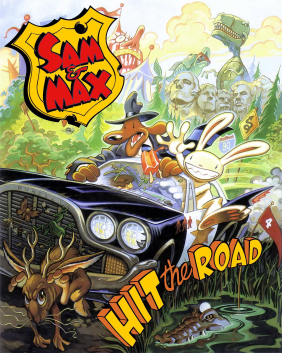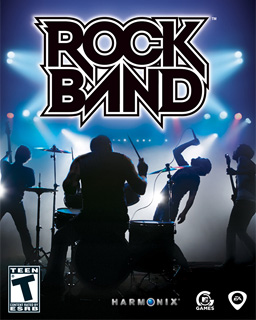
LucasArts Entertainment Company, LLC is an American video game publisher and licensor. Until 2013, it was also a video game developer. LucasArts is best known for its graphic adventure games, as well as games based on the Star Wars and Indiana Jones franchises. Its headquarters are in San Francisco, California.

Sam & Max Hit the Road is a graphic adventure video game released by LucasArts during the company's adventure games era. The game was originally released for MS-DOS in 1993 and for Mac OS in 1995. A 2002 re-release included compatibility with Windows. The game is based on the comic characters of Sam and Max, the "Freelance Police", an anthropomorphic dog and "hyperkinetic rabbity thing". The characters, created by Steve Purcell, originally debuted in a 1987 comic book series. Based on the 1989 Sam & Max comic On the Road, the duo take the case of a missing bigfoot from a nearby carnival, traveling to many Americana tourist sites to solve the mystery.

Donkey Kong 64 is a 1999 adventure platform video game for the Nintendo 64 console, and the first in the Donkey Kong series to feature 3D gameplay. As the gorilla Donkey Kong, the player explores the themed levels of an island to collect items and rescue his kidnapped friends from King K. Rool. The player completes minigames and puzzles as five playable Kong characters—each with its own special abilities—to receive bananas and other collectibles. In a separate multiplayer mode, up to four players can compete in deathmatch and last man standing games.

From the late 1980s to the early 2000s, LucasArts was well known for their point-and-click graphic adventure games, nearly all of which received high scoring reviews at the time of their release. Their style tended towards the humorous, often irreverent or slapstick humor, with the exceptions of Loom and The Dig. Their game design philosophy was that the player should never die or reach a complete dead-end, although there were exceptions.
Mario Party is a party video game series featuring characters from the Mario franchise in which up to four local players or computer-controlled characters compete in a board game interspersed with minigames. The games are developed by NDcube and published by Nintendo, previously being developed by Hudson Soft. The series is known for its party game elements, including the often unpredictable multiplayer modes that allow play with up to four, and sometimes eight, human players or CPUs.

A music video game, also commonly known as a music game, is a video game where the gameplay is meaningfully and often almost entirely oriented around the player's interactions with a musical score or individual songs. Music video games may take a variety of forms and are often grouped with puzzle games due to their common use of "rhythmically generated puzzles".
A minigame is a short video game often contained within another video game, and sometimes in application software or on a display of any form of hardware. A minigame contains different gameplay elements than the main game, may be optional, and is often smaller or more simplistic than the game in which it is contained. Minigames are sometimes also offered separately for free to promote the main game. For instance, the Pokémon Stadium minigames involve merely pressing a few buttons at specific intervals, with little complexity. Some minigames can also be bonus stages or secret levels.

Guitar Hero is a music rhythm video game developed by Harmonix and published by RedOctane for the PlayStation 2 video game console. It is the first entry in the Guitar Hero series. Guitar Hero was released on November 8, 2005 in North America, April 7, 2006 in Europe and June 15, 2006 in Australia. The game's development was a result of collaboration between RedOctane and Harmonix to bring a Guitar Freaks-like game to America.

Cooking Mama is a cookery simulation-styled minigame compilation video game for the Nintendo Wii, Nintendo DS, and iOS platforms, developed by Office Create and published by Taito, Majesco Entertainment, and 505 Games. It was awarded IGN's "Best Of E3" award for 2006. It was followed by a sequel for the DS, Cooking Mama 2: Dinner with Friends. Two games have been made for the Wii: Cooking Mama: Cook Off and Cooking Mama: World Kitchen.

Mario Party 8 is a 2007 party video game developed by Hudson Soft and published by Nintendo. The game is the eighth installment in the Mario Party series, and the first title in the series released for the Wii, and was followed by Mario Party 9.
Kuju Ltd is an international video game developer. Kuju was formed in 1998 in Shalford, Surrey, England, after a management buyout of Simis from Eidos Interactive.

Sam & Max: Freelance Police was a graphic adventure video game developed by LucasArts from 2002 until its cancellation in 2004, and the final game in the company's adventure game era. Freelance Police was originally intended for release for Windows in early 2004 as a sequel to the 1993 title Sam & Max Hit the Road. The game was based on the characters Sam & Max: an anthropomorphic dog and "hyperkinetic rabbity thing" who debuted in a 1987 comic book series created by Steve Purcell. Freelance Police was announced in August 2002, and showcased at the Electronic Entertainment Expo (E3) in 2003. Like its predecessor, Freelance Police was designed as a point-and-click adventure game, but used a 3D game engine in place of the SCUMM and GrimE engines used in older LucasArts adventure games. The project's development was led by Michael Stemmle, one of the original designers for Sam & Max Hit the Road, while Steve Purcell assisted in developing the game's plot and providing artistic direction.

Wii Music is a music video game developed and published by Nintendo for the Wii video game console. The game was released in Japan and North America in October 2008, and in Europe and Australia in the following month. Wii Music is part of both Nintendo's Touch! Generations brand and the Wii series.

Rhythm Tengoku is a rhythm game developed by Nintendo SPD and published by Nintendo. It was released on August 3, 2006, and was the last game developed by Nintendo for the Game Boy Advance. An arcade version of the game was reprogrammed and published by Sega on September 20, 2007. Both versions were released in Japan exclusively. The game has spawned three sequels; Rhythm Heaven, Rhythm Heaven Fever, and Rhythm Heaven Megamix. It began as an idea created by its composer and supervisor Tsunku who proposed it to Nintendo due to his belief that they could do a better job with it than he could.

Furu Furu Park is a collection of minigames for the Wii. It was developed and published by Taito and was originally planned for a release in Japan for the Wii launch, but was pushed back to April 19, 2007. The minigames are inspired by classic Taito arcade games. Majesco Entertainment published the title in the US on January 16, 2008. There are 2 single-player modes and 3 multi-player modes. It has 30 minigames to play.

Rock Band is a music video game developed by Harmonix, published by MTV Games and distributed by Electronic Arts. It is the first title in the Rock Band series. The Xbox 360 and PlayStation 3 versions were released in North America on November 20, 2007, while the PlayStation 2 version was released on December 18, 2007 and the Wii version on June 22, 2008. Harmonix previously developed the first two games in the Guitar Hero series, which popularized gameplay of rock music with guitar-shaped controllers. After development of the series was shifted to Neversoft, Harmonix conceived Rock Band as a new title that would offer multi-instrument gameplay.

Zoë Mode was a subsidiary studio of Kuju Entertainment based in Brighton. Zoë Mode’s games portfolio covered a variety of genres and comprised big-brand entertainment, original social games and innovative gameplay use of motion capture technologies such as the PlayStation EyeToy and Xbox 360 Kinect. They developed EyeToy: Play, SingStar, Disney Sing It and Zumba franchises in music and party games. Zoë Mode was also known for creating Crush, Chime and Haunt.

Crush is a platformer-puzzle video game developed by Kuju Entertainment's Zoë Mode studio and published by Sega in 2007 for the PlayStation Portable. Its protagonist is Danny, a young man suffering from insomnia, who uses an experimental device to explore his mind and discover the cause of his sleeplessness. Each level of the game, representing events from Danny's life and inspired by artists such as Tim Burton and M.C. Escher, requires the player to control Danny as he collects his "lost marbles" and other thoughts.

Plants vs. Zombies is a tower defense video game developed and originally published by PopCap Games for Microsoft Windows and OS X. The game involves homeowners who use a variety of different plants to prevent an army of zombies from entering their houses and "eating their brains". It was first released on May 5, 2009, and made available on Steam on the same day. A version for iOS was released in February 2010, and an HD version for the iPad. An extended Xbox Live Arcade version introducing new gameplay modes and features was released on September 8, 2010. PopCap released a Nintendo DS version on January 18, 2011 with content unique to the platform. The PlayStation 3 version was released in February 2011 also with added new co-op and versus modes found in the Xbox 360 version. An Android version of the game was released on May 31, 2011 on the Amazon Appstore, while it was also released to the Android Market on December 14, 2011. On February 16, 2012, a version was released for BlackBerry PlayBook. Later, a BlackBerry smartphone version of the game was released on January 2013 following the launch of BlackBerry 10. Furthermore, both the original Windows and Mac version of the game have been re-released with additional content in a Game of the Year version. In January 2015, a free ad-supported version of the game was released for iOS.

Kinect Star Wars is a Star Wars video game developed by Terminal Reality and published by LucasArts and Microsoft Studios for the Xbox 360 that uses the Kinect motion peripheral. The game features four game modes: "Jedi Destiny", the primary game mode; podracing; Rancor Rampage; and Galactic Dance-off. In Jedi Destiny, players assume the role models of Jedi Padawans as they wield their lightsabers and use the Force to attack enemies mostly from the prequel trilogy using gestures. Podracing is a race-based game mode, Rancor Rampage is a destruction-based game mode, and Galactic Dance-off is a dance-based game mode similar to the Dance Central series.





















